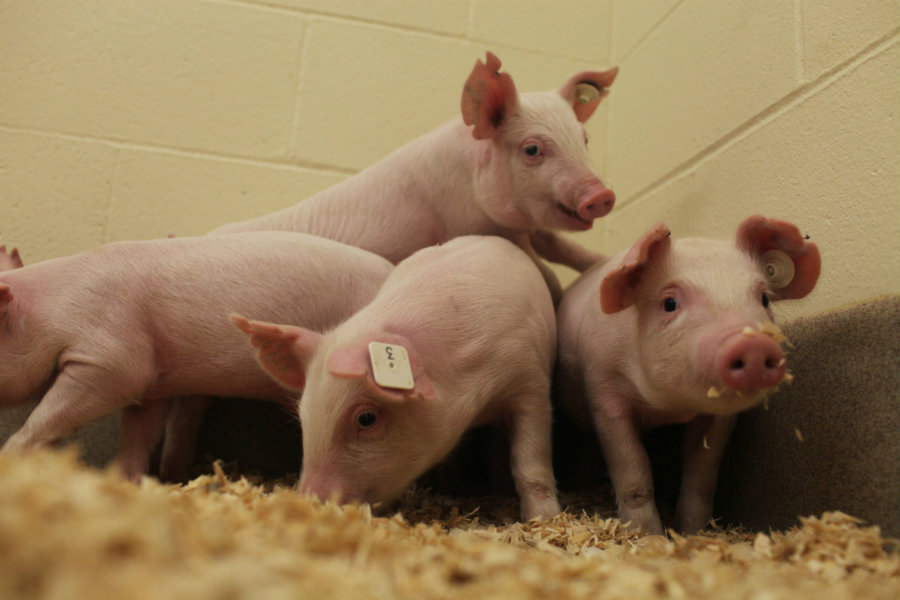A group of scientists successfully created gene-edited piglets without any viruses that might cause disease in humans. The discovery could one day lead to organ transplants from animals to humans.
The findings, published online Thursday in the journal Science, could make it possible one day to transplant hearts, livers, and other pig organs into humans.

About 30,000 patients undergo transplant surgery to receive an organ from a donor each year. However, there aren’t nearly enough donors as are needed, and thousands of people risk losing their lives while waiting for a donor to appear. The United Network for Organ Sharing (UNOS) says that one patient is added to the U.S. transplant waiting list every 10 minutes, and 20 people from that list die each day.
Pig organs could be transplanted into humans within two years
Pigs have been the strongest candidates for xenotransplantation because their organs are similar in size and physiological function to human organs. However, pig organs on their own are not suitable for a transplant because the human body would reject them.
Plus, there is also a risk that pigs’ viruses would infect the person carrying the organ. These animals carry active porcine endogenous retrovirus (PERV), and it’s still unclear if these viruses could be fatal for humans. PERV infection would be especially dangerous for people receiving transplants because these patients are routinely given immunosuppressant drugs that make it difficult to fight off any viruses or bacteria.
But now a group of researchers from Harvard Medical School seems to have solved one of those problems. The team used the gene-editing tool CRISPR-Cas9 to edit pig organs to remove PERV infection that could be harmful to humans.
Dr. George Church, a geneticist at Harvard Medical School who led the experiments, said the research is moving so fast that the first pig-to-human transplants could occur within two years. Dr. David Klassen, chief officer at UNOS, stated that if the pig organs are shown to be safe and effective, they could be “a real game changer.” But he added the work is too new, and its course could be unpredictable.
CRISPR allowed piglets to be born PERV-free for the first time ever
Using the gene-editing tool, the researchers eliminated all traces of the PERV infection from the cell line and conducted in vitro fertilization. The researchers noted there are 25 strains of PERV. In the study, the scientists were able to implant PERV-free embryos into surrogates.
They found the fetuses did not become reinfected with any PERV strain, and the newborn piglets were the first of their species to be born without PERV. Luhan Yang, a biologist who also worked on the experiments, is tasked with monitoring the piglets to look for any long-term effects.

“I’m a strong believer that science can help us improve health care if we look holistically for a solution,” said Yang, lead author of the study and founder of e-Genesis, a biotechnology company funding advancements in the research, according to Newsweek. “Because there are millions of patients who suffer from end-stage organ failure, their life could potentially be saved, or largely improved, by this potential organ resource.”
CRISPR-Cas9 was discovered several years ago, and due to its capability to modify genes, it has led to breakthrough discoveries in the fields of science, technology, and medicine. In fact, using the technique, scientists recently eliminated a genetic abnormality in a human embryo.
Yang has been using CRISPR-Cas9 to solve the organ shortage problem for years. In 2013, she and colleagues published a paper in which they showed CRISPR could be used to accurately and efficiently alter the human immune system. Then, in 2015, Yang and her team eliminated 62 copies of the PERV virus from a pig cancer cell line, which is a world record for scientists using the gene-editing tool.
Pancreases and kidneys could be the first organs to be implanted
Transgenic PERV-free pigs could provide a source for organs as well as islet cells, or tiny cells found throughout the pancreas that produce insulin, said the researchers. Some studies have looked at porcine islet cells transfusions as a potential tool to treat diabetes.
Dixon Kaufman, president of the American Society of Transplant Surgeons and a transplant surgeon at the University of Wisconsin School of Medicine and Public Health, said it’s only a matter of time before xenotransplantation is available for patients.
“I think it is a realistic, almost palpable opportunity,” Kaufman told Newsweek. “Anything that will improve safety, such as deleting this risk of the PERV infection, makes this more viable.”
He noted that it is likely that kidneys and pancreases will be the first solid animal organs transplanted into humans, because they’re not vital organs, meaning a failure wouldn’t necessarily lead to death. While the idea of having a pig organ inside of you might seem strange, Kaufman believes the idea wouldn’t be hard to sell to most patients, who are otherwise facing death.
“The field is inherently sort of risky, to begin with, and I think a lot of patients have already processed that,” he said. “I tell patients in the grand design we were not meant to swap body parts between ourselves.”
Source: Newsweek
